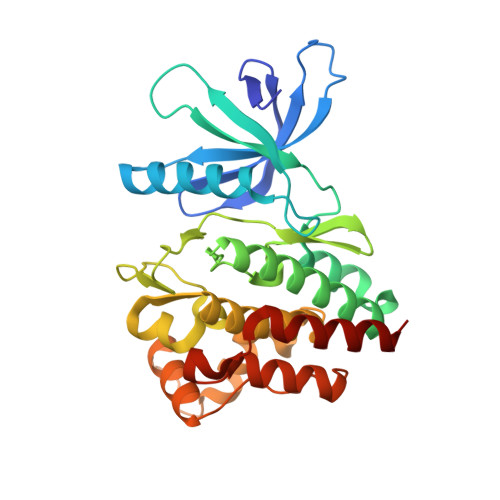Selective JAK3 Inhibitors with a Covalent Reversible Binding Mode Targeting a New Induced Fit Binding Pocket.
Forster, M., Chaikuad, A., Bauer, S.M., Holstein, J., Robers, M.B., Corona, C.R., Gehringer, M., Pfaffenrot, E., Ghoreschi, K., Knapp, S., Laufer, S.A.(2016) Cell Chem Biol 23: 1335-1340
- PubMed: 27840070
- DOI: https://doi.org/10.1016/j.chembiol.2016.10.008
- Primary Citation of Related Structures:
5LWM, 5LWN - PubMed Abstract:
Janus kinases (JAKs) are a family of cytoplasmatic tyrosine kinases that are attractive targets for the development of anti-inflammatory drugs given their roles in cytokine signaling. One question regarding JAKs and their inhibitors that remains under intensive debate is whether JAK inhibitors should be isoform selective. Since JAK3 functions are restricted to immune cells, an isoform-selective inhibitor for JAK3 could be especially valuable to achieve clinically more useful and precise effects. However, the high degree of structural conservation makes isoform-selective targeting a challenging task. Here, we present picomolar inhibitors with unprecedented kinome-wide selectivity for JAK3. Selectivity was achieved by concurrent covalent reversible targeting of a JAK3-specific cysteine residue and a ligand-induced binding pocket. We confirmed that in vitro activity and selectivity translate well into the cellular environment and suggest that our inhibitors are powerful tools to elucidate JAK3-specific functions.
- Department of Pharmaceutical/Medicinal Chemistry, Eberhard-Karls-University Tuebingen, Auf der Morgenstelle 8, 72076 Tuebingen, Germany.
Organizational Affiliation:




















